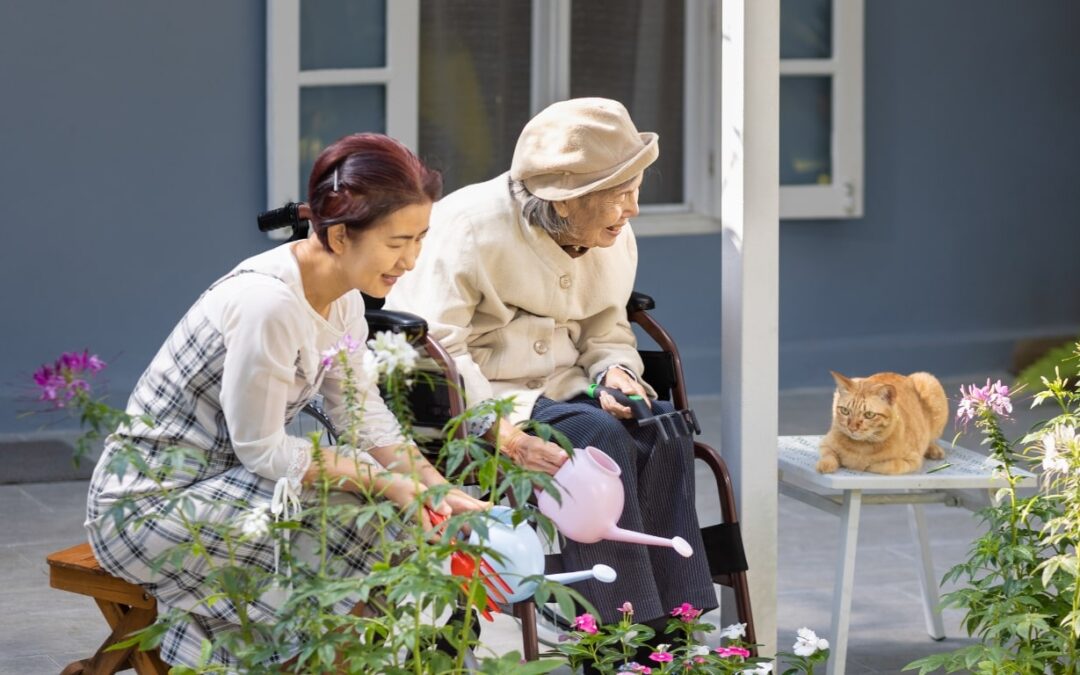There’s something deeply comforting about digging your hands into the soil, feeling the sun on your face, and watching something grow from seed to bloom. Gardening is more than a hobby—it’s a form of therapy. For seniors, especially, gardening offers powerful physical and mental health benefits, along with the simple pleasure of spending time outdoors.
At Reliant Home Care Services, we believe that staying engaged with meaningful, enjoyable activities is key to maintaining wellness and quality of life. Gardening is one of those rare activities that supports the body, stimulates the mind, and lifts the spirit all at once.
Whether you’re an experienced gardener or just beginning, here’s how gardening can benefit you or a loved one, and how to make it safe and accessible for seniors of all ability levels.
The Therapeutic Power of Gardening
Gardening has a number of different physical, mental, and emotional benefits:
1. Physical Health Benefits
Gardening is a gentle form of physical activity that promotes strength, flexibility, and coordination. Tasks like watering, planting, and pruning provide light aerobic movement that can help improve circulation and keep joints limber. Even small movements like reaching, bending, or using hand tools help maintain muscle tone and fine motor skills.
For seniors managing arthritis or other mobility concerns, gardening can be adapted to reduce strain while still offering these physical health benefits. Spending time in the garden also increases vitamin D levels through sun exposure, which supports bone health and immune function.
2. Mental and Emotional Well-Being
Gardening has been shown to significantly reduce stress, anxiety, and depression. According to the Columbia Center for Community Health, gardening can lower the amount of cortisol, the body’s stress hormone, while improving mood and promoting relaxation. It offers a peaceful, mindful experience that encourages focus and calm.
For seniors coping with loneliness or loss, nurturing plants can offer a renewed sense of purpose. Tending to a garden and watching plants thrive under your care fosters feelings of accomplishment and joy. This emotional boost can make a real difference in overall mental health and daily outlook.
3. Cognitive Engagement
Gardening is also an excellent way to engage the mind. Remembering plant care routines, identifying different species, and planning seasonal tasks all stimulate memory and cognitive function. For seniors living with dementia or other cognitive impairments, garden-related activities can provide comfort, sensory stimulation, and meaningful engagement.
Making Gardening Accessible for Seniors
Every senior deserves the opportunity to enjoy the rewards of gardening, regardless of physical limitations. With a few thoughtful modifications, gardens can be made safer, more comfortable, and more enjoyable for older adults.
Raised Garden Beds and Containers
One of the most effective ways to create an accessible garden is to bring the plants closer to you. Raised beds and container gardens reduce the need for bending or kneeling, making them ideal for seniors with limited mobility. Planters placed on sturdy tables or stands allow for comfortable, seated gardening.
Use Lightweight, Ergonomic Tools
Standard gardening tools can be heavy or difficult to grip. Look for tools made with padded, ergonomic handles and lightweight materials that were designed specifically for seniors. Tools with extended handles also reduce the need to reach or strain.
Create a Safe, Comfortable Space
Gardens should be easy to navigate and comfortable to spend time in. Choose wide, flat pathways with non-slip surfaces and keep the area clear of tripping hazards. Provide shaded seating so you can rest as needed and enjoy the surroundings without overexposure to the sun.
Watering Made Simple
Heavy hoses and watering cans can be difficult to manage. Consider installing a drip irrigation system or using lightweight hoses with easy-to-use nozzles. You can also keep water sources close to the garden area to reduce walking distance.
Getting Started with Gardening
If you’re new to gardening, start small. A few pots of herbs, a tomato plant, or a tray of colorful flowers can be incredibly rewarding. Choose low-maintenance plants that thrive in your climate and require minimal upkeep, such as lavender, marigolds, mint, or cherry tomatoes.
Don’t be afraid to ask for help. Whether it’s a family member, a neighbor, or one of our caregivers, gardening can become a shared activity that strengthens relationships and builds community.
Remember, gardening doesn’t have to be perfect to be beneficial. The goal isn’t to create a flawless landscape, it’s to enjoy the process, spend time outdoors, and feel connected to nature and yourself.
Growing More Than Plants
At its heart, gardening is about growth, not just of plants, but of joy, resilience, and well-being. For seniors, this simple act can provide daily moments of peace, pride, and pleasure. It’s a powerful reminder that no matter your age or ability, you can still nurture something beautiful.
At Reliant Home Care Services, we support seniors in enjoying life’s meaningful moments. Whether it’s assistance with daily activities or companionship in the garden, our caregivers are here to help you stay active, safe, and engaged in the things that bring you joy.
Interested in making gardening a part of your care plan? Contact Reliant today to learn how we can help you or a loved one create an accessible, therapeutic garden at home.




